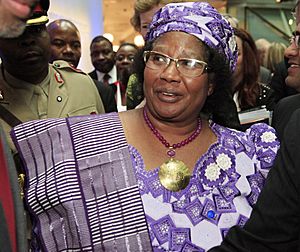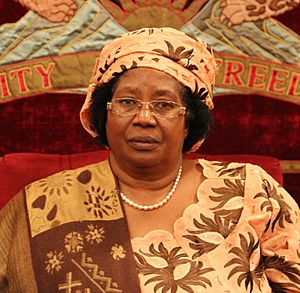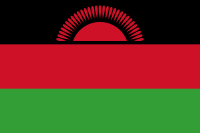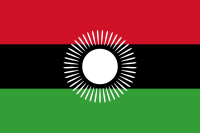Joyce Banda facts for kids
Quick facts for kids
Joyce Banda
|
|
|---|---|

Banda in 2013
|
|
| 4th President of Malawi | |
| In office 7 April 2012 – 31 May 2014 |
|
| Vice President | Khumbo Kachali |
| Preceded by | Bingu wa Mutharika |
| Succeeded by | Peter Mutharika |
| Vice President of Malawi | |
| In office 29 May 2009 – 7 April 2012 |
|
| President | Bingu wa Mutharika |
| Preceded by | Cassim Chilumpha |
| Succeeded by | Khumbo Kachali |
| Minister of Foreign Affairs | |
| In office 1 June 2006 – 29 May 2009 |
|
| President | Bingu wa Mutharika |
| Preceded by | George Chaponda |
| Succeeded by | Etta Banda |
| Minister of Gender, Child Welfare, and Community Service | |
| In office 2004–2006 |
|
| President | Bingu wa Mutharika |
| Personal details | |
| Born |
Joyce Hilda Ntila
12 April 1950 Malemia, Nyasaland (now Malawi) |
| Political party | United Democratic Front (Before 2004) Democratic Progressive Party (2004–2010) People's Party (2011–present) |
| Spouses | Roy Kachale (Before 1981) Richard Banda |
| Children | 5 |
| Alma mater | Columbus University Atlantic International University Royal Roads University |
Joyce Hilda Banda (born 12 April 1950) is a Malawian politician. She served as the President of Malawi from April 7, 2012, to May 31, 2014. She became president after the sudden death of President Bingu wa Mutharika. Joyce Banda is also the founder and leader of the People's Party, which she started in 2011.
Before becoming president, she was an educator and a strong supporter of women's rights. She served as the Minister of Foreign Affairs from 2006 to 2009. From May 2009 to April 2012, she was the Vice-President of Malawi. She also worked as a member of Parliament and as Minister of Gender and Child Welfare.
Joyce Banda founded several important organizations. These include the Joyce Banda Foundation, the National Association of Business Women (NABW), and the Young Women Leaders Network. She also helped establish the Hunger Project in Malawi.
Banda was Malawi's fourth president and its first female president. She was also the second woman to become president in Africa, after Ellen Johnson Sirleaf of Liberia. She was also Malawi's first female vice-president. In 2014, Forbes magazine recognized her as the 40th most powerful woman in the world. She was also named the most powerful woman in Africa. In October 2014, the BBC included her in their list of 100 inspiring women.
Contents
- Early Life and Family
- Political Journey
- Life After Presidency
- Joyce Banda Foundation
- National Association of Business Women
- Helping Communities and Global Health
- Awards and Recognition
- See also
Early Life and Family
Joyce Hilda Ntila was born on April 12, 1950. Her birthplace was Malemia, a village in the Zomba District of Nyasaland. This area is now part of Malawi. Her father was a musician in a police band. Joyce Banda started her career as a secretary. She became well-known during the time when Hastings Banda was the leader of Malawi.
She studied at several universities. She earned degrees in Early Childhood Education and Gender Studies. She also received a diploma in managing non-governmental organizations (NGOs). Later, she earned a Master of Arts degree in Leadership from Royal Roads University in Canada. In 2013, she received an honorary doctorate from Jeonju University.
Joyce Banda first married Roy Kachale and had three children with him. In 1975, while living in Nairobi, Kenya, she decided to leave her difficult marriage. Her marriage to Roy Kachale ended in 1981. Later, she married Richard Banda, who was a retired Chief Justice of Malawi. They have two children together.
Between 1985 and 1997, Joyce Banda started and managed several businesses. These included Ndekani Garments, Akajuwe Enterprises, and Kalingidza Bakery. Her success inspired her to help other women. She wanted to help them become financially independent and escape difficult situations.
Her sister, Anjimile Oponyo, used to be the CEO of the Raising Malawi Academy for Girls. This school was supported by the famous singer Madonna.
Political Journey
Early Public Service (1999–2009)
Joyce Banda began her political career in 1999. She won a seat in Parliament during Malawi's third democratic election. She was a member of President Bakili Muluzi's party, the United Democratic Front. She represented the Zomba Malosa area. President Muluzi appointed her as Minister for Gender and Community Services.
As a minister, she worked hard to pass the 2006 Domestic Violence Bill. This law aimed to protect people from violence in their homes. She also created plans to help orphans and vulnerable children. She launched a campaign to stop child abuse.
In 2004, she was re-elected to Parliament. Bingu wa Mutharika became President of Malawi. Even though Banda was not in his party, President Mutharika appointed her Minister of Foreign Affairs in 2006. Banda helped change Malawi's diplomatic ties from Taiwan to mainland China. She believed this change would bring economic benefits to Malawi. In 2010, China completed building a new parliament building in Lilongwe.
Serving as Vice-President (2009–2012)
In the 2009 presidential election, Joyce Banda ran as the vice-presidential candidate. She was with Mutharika, who was the presidential candidate for the Democratic Progressive Party (DPP). She became Malawi's first female vice-president.
Later, in a surprising move, Joyce Banda and the second vice-president, Khumbo Kachali, were removed from their party roles in the DPP in December 2010. This was due to what the party called 'anti-party' activities. President Mutharika tried to give her duties to others. However, the court stopped attempts to remove her as Vice-President because of constitutional rules. She remained the legal Vice-President, as the position is required by the constitution.
Forming the People's Party
The relationship between Banda and President Bingu wa Mutharika became difficult. This was because Mutharika seemed to want his brother, Peter Mutharika, to be his successor. Even though she was removed from her party role in the DPP, Joyce Banda continued to serve as Vice-President of Malawi. This led many people to leave the DPP and support her.
Joyce Banda founded the People's Party in 2011. She started this party after being expelled from the ruling DPP. This happened because she did not support President Mutharika's younger brother, Peter Mutharika, to become the next president.
Becoming President (2012–2014)
Smooth Transition of Power
On April 5, 2012, President Mutharika passed away. There was a delay in announcing his death, which caused some worry about a constitutional crisis.
Malawi's former President Bakili Muluzi stressed the importance of following the constitution. He said that the vice-president must automatically take power. Malawi's security forces also wanted the constitutional order to be followed. The Malawi Law Society confirmed that under the constitution, Joyce Banda was the rightful successor.
On April 7, Malawi's cabinet tried to block Banda from becoming president. In response, she called the army commander, General Henry Odillo. He agreed to support her and sent troops to protect her home.
Joyce Banda was sworn in as President of Malawi on April 7, 2012. She was the first woman to hold this high office. The ceremony took place at the National Assembly in Lilongwe. After being sworn in, Banda asked for national unity. She said, "I want all of us to move into the future with hope and with the spirit of oneness and unity."
Both Malawian and international media praised Joyce Banda's smooth inauguration. They called it a victory for democracy. A Malawi Sunday Times editorial said her inauguration helped strengthen democracy in the country.
Cabinet and 2014 Election
On April 26, 2012, President Banda chose her cabinet. It included 23 ministers and nine deputy ministers. She took on several important roles herself to strengthen her leadership.
In October 2013, President Joyce Banda dismissed her cabinet. This happened after the Capital Hill Cashgate scandal, which involved corruption. On October 15, a new cabinet was appointed. Notably, Finance Minister Ken Lipenga and Justice Minister Ralph Kasambara were not included.
In May 2014, Joyce Banda lost the presidential election. She tried to have the election results cancelled but was unsuccessful. She did not attend the swearing-in of the winner, Peter Mutharika, but she congratulated him. She lived outside Malawi starting in 2014. Investigations into past events during her presidency were ongoing. She denied any wrongdoing and stated she would return to address the matters.
International Relations
During the previous presidency, Malawi's economy was struggling. This was partly due to difficult foreign relations. Many countries and organizations had stopped giving financial aid to Malawi. They were concerned about attacks on democracy and unpredictable policies.
One of President Banda's main goals was to fix Malawi's relationships with aid donors. She also worked to improve ties with neighboring countries like Mozambique and regional countries like Botswana.
Within her first week as president, Banda began working to repair Malawi's international relations. She spoke with officials from the United Kingdom and the United States. They promised to resume discussions on financial aid. She also planned to speak with representatives from the European Union and the IMF. She and Zambian president Michael Sata discussed improving their working relationship.
To further please donors, Banda's government decided not to host the African Union summit in July 2012. This was because the AU insisted that Sudan's president Omar al-Bashir be protected from an arrest warrant. Banda's cabinet decided these conditions were unacceptable.
Domestic Policies
National Symbols
Within two months of taking office, Banda's government proposed a law to bring back Malawi's original 1964 flag. This flag, with a "rising-sun" design, replaced the version adopted in 2010 under Bingu wa Mutharika.
Economic Reforms
Following advice from the International Monetary Fund (IMF), Banda changed the exchange rate system. In May 2012, she devalued the Malawian currency (kwacha) by 33 percent against the US dollar. This was done to stop an illegal market and get more international support.
- Short-term effects: This change, along with higher fuel prices, caused inflation to rise above 34 percent. This led to strikes and protests in January 2013.
- Medium-term recovery: By late 2013, the IMF reported that the economy was recovering. Inflation began to fall. It was expected to drop to 19.6 percent in 2014 as the currency became more stable.
- Donor support: Many donors who had stopped financial support under the previous president restarted it after Banda's reforms. This included a US $350-million grant.
These policy changes were part of the government's Economic Recovery Plan for 2012–2014. The plan combined market-based reforms with programs to help people.
Austerity Measures
To reduce government spending, President Banda promised to cut her own salary by 30 percent. She also ordered the sale of a presidential jet that her predecessor had bought. The aircraft was sold in May 2013 for US $15 million. Government officials said the money was used to pay off a defense debt and buy maize and medicines.
Public Reaction
While Banda's reforms helped restore trust from international donors, they also led to higher living costs for many families. This affected her popularity before the 2014 election. Experts still discuss the long-term benefits of the 2012 currency change. However, later assessments from the IMF and World Bank credit these policies with preventing a financial crisis and setting the stage for new growth.
Presidential Initiatives
President Banda has always been dedicated to maternal health. She strongly supported safe motherhood in Malawi. She showed this support by creating the Presidential Initiative on Maternal Health and Safe Motherhood. In just two years, this initiative helped reduce the number of maternal deaths.
Flag Change
After the flag was changed in 2010 by the previous government, many people disagreed with it. On May 28, 2012, Banda led the country's Members of Parliament to vote. They decided to change the flag back to its original independence flag, which was first adopted in 1964. All parties, except the DPP, voted to return to the original flag.
Life After Presidency
Return to Malawi (2018)
Joyce Banda returned to Malawi on April 28, 2018. She had been living outside the country for more than three years. During this time, she was a distinguished fellow at the Woodrow Wilson Center and the Center for Global Development in the United States.
Although there had been investigations related to the 2013 "Cashgate" scandal, the Anti-Corruption Bureau stated in May 2018 that investigations were ongoing. Banda had not been formally charged at that time.
Electoral Alliances (2019–2020)
The People’s Party first nominated Banda for the 2019 presidential election. However, on March 15, 2019, she withdrew and supported opposition candidate Lazarus Chakwera.
After the Constitutional Court cancelled the 2019 election results, Banda campaigned for Chakwera in the June 2020 rerun. She publicly congratulated him after his victory. Chakwera’s first cabinet, announced on July 8, 2020, included Banda’s son, Roy Akajuwe Kachale-Banda, as Minister of Industry.
Global Advocacy and Philanthropy (2021–2024)
Banda has continued to be active in global health and development.
- In May 2021, she joined other former leaders and Nobel laureates. They wrote an open letter asking the G7 countries to remove COVID-19 vaccine patents. This would help make vaccines more available and fight diseases like AIDS.
- On March 11, 2023, she was among nearly 200 world figures who signed the People’s Vaccine Alliance "Never Again" statement. This statement called for fair responses to future pandemics.
- In February 2023, Banda became one of three "grain ambassadors" for Ukraine. She helped identify African countries most in need of Ukrainian grain during the conflict.
Through the Joyce Banda Foundation Trust, she has continued her work on food security and education. For example, in January 2024, she distributed maize to 500 families affected by Cyclone Freddy. In 2024, she also launched a K315 million scholarship program for secondary-school girls.
Presidential Candidacy (2025)
On June 23, 2025, the People’s Party National Executive Committee fully supported Banda as its presidential candidate for the 2025 Malawian general election. Announcing her campaign in Lilongwe, she said that Malawi needs a new vision. This vision should focus on creating jobs for young people and helping women become economically strong.
Her campaign, called "A New Malawi for the Youth Initiatives (A.Ma.Y.I.)," focuses on several key areas. These include free secondary education, mobile health clinics, fighting corruption, and supporting young entrepreneurs.
Joyce Banda Foundation
Before becoming vice-president, Joyce Banda founded and led the Joyce Banda Foundation for Better Education. This charity helps Malawian children and orphans through education. It includes primary and secondary schools in Blantyre. It also has an orphan care center that helps 600 children. The foundation supports nearby villages by providing small loans to women and youth groups. It has also given seeds to over 10,000 farmers and provided other donations. The foundation has built four clinics in some of the 200 villages it assists. It also helps with rural development. The foundation works with the Jack Brewer Foundation, a global development organization started by NFL star Jack Brewer.
National Association of Business Women
Banda founded the National Association of Business Women in Malawi in 1990. This is a registered non-profit organization in Malawi. The association aims to help women escape poverty. It does this by strengthening their skills and helping them become financially independent. It is a network of 30,000 women who support women's businesses. They also help women who want to start businesses. Their activities include business training, technical training, and teaching record-keeping and management skills. They also work with leaders to create policies that support women business owners. The current director is Mary Malunga. Since 2003, the foundation has partnered with the Netherlands-based Humanist Institute for Development Cooperation (Hivos).
Helping Communities and Global Health
Joyce Banda has been involved in many community projects for women since she was 25. She has worked to bring about policy changes, especially in education. She founded the Joyce Banda Foundation for Better Education. She also started the Young Women Leaders Network, the National Association of Business Women, and the Hunger Project in Malawi.
In 1997, she received the Africa Prize for Leadership for the Sustainable End of Hunger. She shared this award with President Joaquim Chissano of Mozambique. She used the prize money to help build the Joyce Banda Foundation for children. In 2006, she received the International Award for the Health and Dignity of Women. This was for her dedication to the rights of women in Malawi.
She served as a commissioner for "Bridging a World Divided" alongside important figures like Bishop Desmond Tutu. Banda was also on the Advisory Board for Education in Washington D.C. She was also on the advisory board for the Federation of World Peace and Love in Taiwan.
As part of government efforts to save money in October 2012, Banda cut her salary by 30%. She also announced that the presidential jet would be sold.
Global Leaders Council for Reproductive Health
In 2010, Banda became a member of the Global Leaders Council for Reproductive Health. This group includes current and former heads of state and other leaders. They are committed to improving reproductive health for lasting development and prosperity. The council aims to gather political support and money to ensure everyone has access to reproductive health by 2015. This was a key goal of the UN Millennium Development Goals.
Awards and Recognition
National Awards
- Woman of the Year, Malawi, 1997
- Woman of the Year, Malawi, 1998
- Nyasa Times Multimedia “Person of the Year”, 2010
International Awards
- Martin Luther King Jr. Drum Major Award, 2012, Washington D.C.
- Legends Award for Leadership, 2012, Greater African Methodist Episcopal Church
- Women of Substance Award, 2010, African Women Development Fund
- Africa Prize for Leadership for the Sustainable End of Hunger, 1997, The Hunger Project, New York
- International Award for Entrepreneurship Development, 1998, Africa Federation of Women Entrepreneurs & UN Economic Commission for Africa
- 100 Heroines Award, 1998, Rochester, New York
- Certificate of Honors, 2001, Federation of World Peace and Love, Taiwan
- Reykjavík Global Forum / Women Political Leaders (WPL) Trailblazer Award, 2020, Iceland
Honors
- Forbes magazine – World’s Most Powerful Women: #40 (2014) | #47 (2013) | #71 (2012)
- Forbes magazine – Africa’s Most Powerful Women: #1 (2012) | #3 (2011)
- Included in the BBC 100 Women series, October 2014
- Included in Outstanding Women in Africa list, 2022, New Africa Magazine
See also
 In Spanish: Joyce Banda para niños
In Spanish: Joyce Banda para niños
- Malawian Constitutional Crisis 2012
- List of current members of the National Assembly of Malawi
 | Leon Lynch |
 | Milton P. Webster |
 | Ferdinand Smith |




